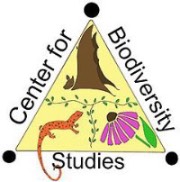Center for Biodiversity Studies

The Center for Biodiversity Studies is a network of core faculty members and associated students plus collaborating researchers and institutions. Our mission is to investigate and document biological diversity at spatial scales ranging from local to global, across temporal scales of historical, contemporary, and future, and to synthesize and disseminate diversity information to promote appreciation, comprehension, and conservation of biological resources.
CBS Mission
Current and Long-Term Vision of CBS
Biodiversity is declining rapidly across the globe. Science forms the keystone to understanding and conserving this crisis of diversity loss. Our mission is to investigate and document biological diversity at scales ranging from local to global, and to synthesize and disseminate diversity information to promote comprehension, appreciation, and conservation of biological resources. The contextual basis for biodiversity studies straddles three temporal scale of (1) historical, (2) contemporaneous, and (3) future/predictive. Our longer-term vision is to continue to foster and further collaborative efforts, including research and grant proposals, within the core research areas that contribute to overall CBS goals.
Core Expertise(s):
Who are We?
CBS is a network of faculty members and associated students, as well as collaborating researchers and institutions both domestic and international. Members work collaboratively and independently, across our four primary core research areas of (1) systematics and evolution, (2) ecology and conservation, (3) human-wildlife conflict and mitigation, and (4) karst science and climate issues.
CBS Goal
Our most important function as a center is to emphasize, support, and integrate research, both basic and applied, with undergraduate and graduate students. The student-faculty research relationship has been and will continue to be central to the goals of this center. CBS faculty will continue to (1) seek external and internal grants and contracts to support faculty-student research in core areas, (2) work to increase the number of Master’s and Honors Undergraduate students, (3) present more research at prominent national and international meetings, and (4) publish more research.
Overall, our goals are multifaceted and three-fold, namely to (1) facilitate biodiversity research at regional, national, and international scales, (2) promote networks of collaboration among WKU faculty, staff, graduate and undergraduate students, as well as regional, national, and international scientists, resource managers, and museum curators, and (c) continue to develop infrastructure and capacity for future research via student training and external funding.
Student Outcomes
Recent outcomes during the 2019-2020 academic year include:
Successfully defended theses for 7 CBS-funded MS research students
Successfully defended theses for 3 Undergraduate Honors research students
CBS faculty published 11 peer-reviewed papers with 13 current or recent former CBS-funded graduate students, including 7 as 1st author
CBS faculty published 4 peer-reviewed papers with WKU undergraduate students
For more information visit the CBS home page here.

